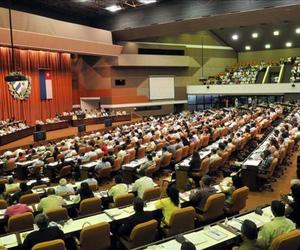Cuba to expand non-state economy
- Submitted by: lena campos
- Politics and Government
- 07 / 26 / 2012

Cuba's parliament approved a plan to open up more than 200 additional economic activities to non-state cooperatives as well as a new tax law, but the session ended without action on the liberalization of travel and emigration regulations announced a year ago.
In a speech lasting a little over 30 minutes, President Raul Castro on Monday brought to a close the first of the parliament's two sessions for 2012.
The National Assembly authorized the creation of private cooperatives in 222 economic activities, including gastronomy and "technical and personal services."
So far in Cuba, cooperatives have only been permitted in the agricultural sector.
Also, the green light was given to the semi-privatization of state-run gastronomic establishments and services with a payroll of up to five workers, a move similar to that which was put in place to govern certain barber shops and beauty salons.
These decisions, Castro said, will allow the state to "disengage itself" from administering secondary production and services to concentrate on the management of "fundamental means of production" that will continue to be controlled by state-run agencies.
The socialist state-run company, he noted, is the "main form of the national economy" and to perfect it he announced another experiment starting next year to remove the "brakes" in the development of the country's productive forces.
As was previously announced, Cuban lawmakers approved a new "more modern and flexible" tax law, in accord with the economic reforms already implemented on the Communist-ruled island, where a limited zone for private initiative has been opened up.
Meanwhile, Castro said that the scope of the plan to hand over state-owned agricultural land to individuals will be broadened to allow parcels of up to 67.1 hectares (about 168 acres) to be made available to private farmers.
Also, the people newly designated to be allowed to work that land for their own benefit will be able to build permanent homes on those parcels and the right to use the land will be guaranteed to the relatives of the title holders.
At the session, however, there were no advances made on certain issues such as the long-awaited immigration reform that Castro announced a year ago.
"In the latest speeches before this Parliament, I dealt with the updating of the immigration policy, a question that has not been relegated to last place, but on the contrary we have continued to go into it in depth (with an eye toward) making it gradually more flexible, taking into account the associated effects and the international scene," the president said.
During his address, Castro mentioned one of the top current issues on the island: the cholera outbreak in the eastern part of the country. But he did so only to denounce propagandistic campaigns and "distortions" aimed at "discrediting" the Cuban health care system.
The outbreak, which is mainly affecting the city of Manzanillo, is "under control," he said.
According to the latest government figures, three elderly people have died from cholera and 158 other people have been infected.
Source: EFE
Comments